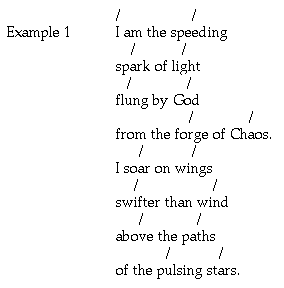Living Glossary
- Antecedent Action: Events relating to a work of literature but which occurred before the action begins.

Ex.
Antecedent strengthening seems to fail.
- Aside: A short speech in a play that is heard only by the audience, not other characters.

Ex. After all the other characters leave he speaks
Aside himself.
- Black Humour: Humour derived from topics normally considered decidedly unfunny - usually death.

Ex. He liked to use
Black Humour to hide his fear of death.
- Blank Verse: Unrhymed iambic pentameter.

Ex. He used
Blank Verse to write his poem.
- Catastrophe: The point in a tragedy where disaster strikes and the protagonist dies.

Ex. It was a
Catastrophe when Jack died that day.
- Catharsis: The purification of the emotions by the way of release and renewal.

Ex. She used
Catharsis to get rid of stress.
- Closet dramas: Plays meant to be read rather than preformed.

Ex. He meant it as a
Closet Drama so no one could preform it.
- Comic Relief: A humorous scene designed to ease the tension in an otherwise serious play.

Ex. It was getting serious until someone used
comic relief.
- Complication: The part of the plot in a work of literature in which the conflict gets going and begins to develop.
- Conclusion: In a tragedy, the short scene at the end that foreshadows what will happen now that the protagonist is dead.
- Crisis: The climax or, more precisely, the situation that brings about the climax, in work of literature.
- Dramatic Purpose: The precise purpose served by each scene in a play - for instance, to develop plot, to reveal theme, or to develop character.
- Eulogy: A speech that praises a person.
- Falling Action: That part of a tragedy in which the fortunes of the protagonist are in decline.
- Groundlings: Lower-class Elizabethan theatre-goers who stood on the ground around the stage to watch a play.
- Initial Incident: The event that gets the plot of a work of literature going.
- Melodrama: An exaggerated, formula-written drama. Usually full of blood and gore, intended only for its emotional impact.
- Motif: A recurring idea, image, or phrase that acts as a unifying device in a work of literature.
- Pathos: The quality that arouses in observers a sense of pity and compassion.
- Rising Action: The series of events leading to the climax of a work of literature.
- Soliloquy: A speech in a play given by a character alone on stage in order to reveal his or her thoughts and feelings.
- Tragedy: A dramatic work in which a noble protagonist suffers personal destruction, usually because of a fatal flaw in his or her character.
- Tragic Flaw: The shortcoming in the character of a tragic hero that leads to his or her destruction.
- Tragic Hero: The protagonist of a tragedy.
- Serendipitous: Things happen for a reason.
- Verisimilitude: When a piece of art creates a false sense of reality.
- Metonomy: A close association represents the whole.
- Milieu: In the middle -Social context.
- Malapropism: Is the use of an incorrect word in place of a word with a similar sound, resulting in non-nonsensical, often humorous utterance.
- Ubiquitous: Being or seeming to be everywhere at the same time.
 Ex. Antecedent strengthening seems to fail.
Ex. Antecedent strengthening seems to fail. Ex. After all the other characters leave he speaks Aside himself.
Ex. After all the other characters leave he speaks Aside himself. Ex. He used Blank Verse to write his poem.
Ex. He used Blank Verse to write his poem.  Ex. It was a Catastrophe when Jack died that day.
Ex. It was a Catastrophe when Jack died that day.  Ex. She used Catharsis to get rid of stress.
Ex. She used Catharsis to get rid of stress.  Ex. He meant it as a Closet Drama so no one could preform it.
Ex. He meant it as a Closet Drama so no one could preform it. Ex. It was getting serious until someone used comic relief.
Ex. It was getting serious until someone used comic relief.
No comments:
Post a Comment